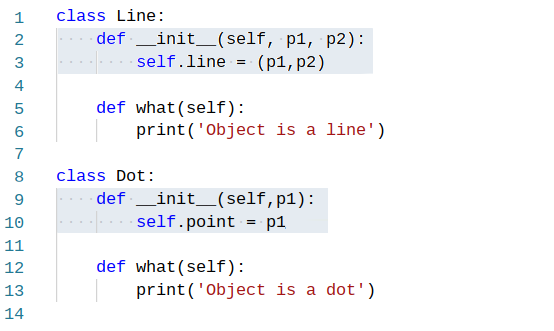python class constructor default values
1 week ago Nov 07 2018 default constructor. We can create a class without any constructor definition.

Object Oriented Programming In Python
Adding default values is a straightforward task.

. A default constructor in Python is a constructor when we dont add the constructor in the class or sometimes we forget to declare it then we can say it is a Default constructor. Selffoo if foo is None else foo. Syntax for creating constructor in Python.
Selfname name selfage age selfclassroom classroom display Student def showself. If selffuel 0. Printselfmsg creating object obj Test objdisplay.
Constructor with parameters is known as. If wordList is None. Return A 42 def __init__ self b_value.
Printselfname selfage selfclassroom creating object of the Student class emma StudentEmma emmashow kelly StudentKelly 13. The default constructor is a simple constructor which doesnt accept any arguments. To add optional arguments to classes in Python we have to assign some default values to the arguments in the classs constructor function signature.
Accepts two arguments name and salary with default value 0 creates two attributes also called name and salary sets their values to the corresponding arguments. SelfwordList else. The default value will be considered if no values are passed for these optional.
Selfmsg Default constructor a method for printing data members def displayself. Among other purposes this can be used to specify fields with mutable default values as. The parameterized constructor takes its first argument as a.
Def __init__self name Enterprise fuel 0. Default constructor def __init__self. Class with No Constructor.
Def __init__ self fooNone. The following code snippet shows how to eliminate the need for multiple constructors with the default parameter constructor in Python. The default parameter constructor assigns the specified value to the class attribute if some value is specified during the object creation.
Self takes the address of the object as its argument and it is automatically provided by Python. Example Default constructor in Python The constructors are to initialize assign value to the data members of the class when an object of the class is created. Constructors in Python - GeeksforGeeks.
The student classs __init__ method can be converted to a non-parameterized constructor as follows. The constructor of a class is unique. Selfname Monica selfroll 15 def showself.
In this case the superclass constructor is called to initialize the instance of the class. The object class is the base of all the classes in Python. Objects can start up any task in the python program assigned to them as a constructor has enough resources.
To create a constructor in Python we need to define a special kind of magic method called __init__ inside our class. By default this method takes one argument known as self. To continue with the.
Adding default values is a straightforward task. Create a new instance of the target class. For example name of the class person age of the class person etc.
Constructor with parameters is known as parameterized constructor. Initialize the instance with suitable instance attribute values. Initiating objects from different classes will call different constructors.
SelfadjacencyList else. Hash values are just integers which are used to compare the dictionary keys during a dictionary lookup quickly. We have to equate arguments to their default values like x 3 name Untitled etc.
Non-parameterized constructors assign default values to the attributes of the class. Ab_classespy class A. Print Initialize the new instance of A self.
Def __new__ cls args kwargs. If provided it must be a zero-argument callable that will be called when a default value is needed for this field. The constructor in python helps in initialization of the object when we want to start it.
Mutable default arguments dont generally do what you want. Parameterized constructor constructor with parameters is known as. The default constructor is a simple constructor which doesnt accept any arguments.
In this article we will learn how to set optional arguments for classes in Python. Define the class Employee with a constructor __init__ that. Its definition has only one argument which is a reference to the instance being constructed.
Def __init__ self wordListNone adjacencyListNone. The method used to call constructor is __init__. Default constructor this is the one which we have seen in the above example.
If provided this will be the default value for this field. Up to 50 cash back 2. Its definition has only one argument which is a reference to the instance being constructed.
Def __init__ self a_value. The constructor can have different values in the member variables. This is needed because the field call itself replaces the normal position of the default value.
Then two objects are created but different constructors are called. Def __init__self name Tom. Def __init__ self nameUndefined number-1.
This constructor doesnt accept any arguments. The example belwo shows two classes with constructors. Types of constructors in Python with examples - Code Types in Python Python Constructors.
Selffuel 0 print selfname nFuel selffuel n main ship1 Ship ship1status ship2 ShipSpace Ship1 ship2status ship3 Ship10 ship3status ship4 ShipSpace Ship2 10 ship4status. Selfname printRoll no. Print Initialize the new instance of B self.
Default values of newly created objects can be set in the constructor. Set Optional Arguments for a Class Constructor in Python. SelfwordList wordList if adjacencyList is None.
Constructor with default values age and classroom def __init__self name age12 classroom7. Take Hint -10 XP. A_value a_value class B.
Selfroll As you would have noticed the __init__ method has no. Default constructor in python. Selfname name def showself.
The default constructor is a simple constructor which doesnt have any argument to pass. In Python the class name provides what other languages such as C and Java call the class constructorCalling a class like you did with Person triggers Pythons class instantiation process which internally runs in two steps. Selfname name selfnumber number.
We have two types of constructors in Python. We can define as many parameters as we need. Even if we dont have a constructor still we can create an object for the class because there is a default constructor implicitly injected in python code.
To add optional arguments to classes in Python we have to assign some default values to the arguments in the classs constructor function signature. If any of the arguments are mutable then you need to use the usual idiom. Selfname name selffuel fuel def statusself.
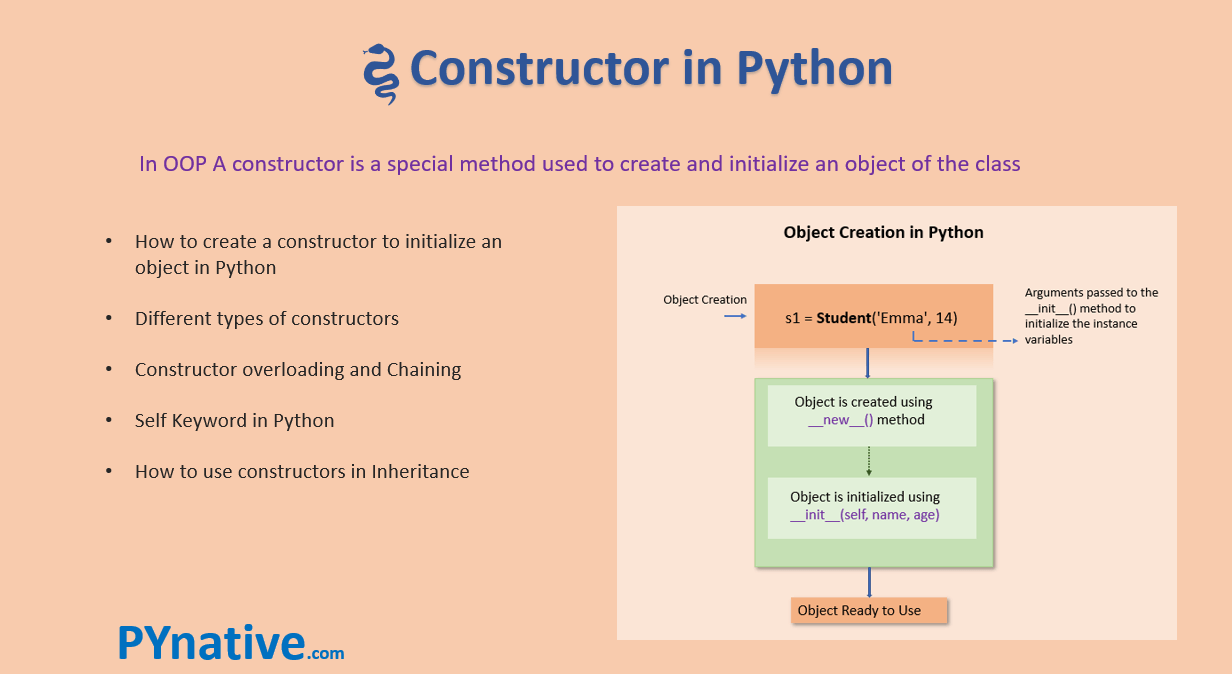
Constructor In Python Guide Pynative

How Default Base Class Constructors Are Used With Inheritance Webucator

Constructor In Python Working Of Python Constructor Wih Sample Code

Constructor In Java Simplilearn
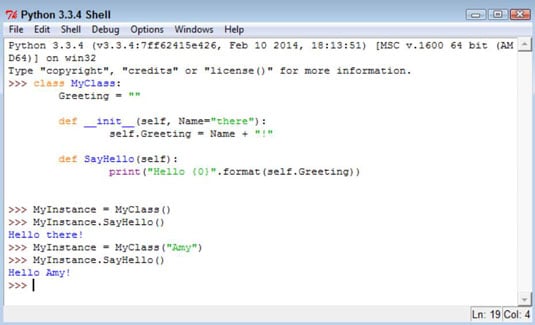
How To Create A Constructor In Python Dummies
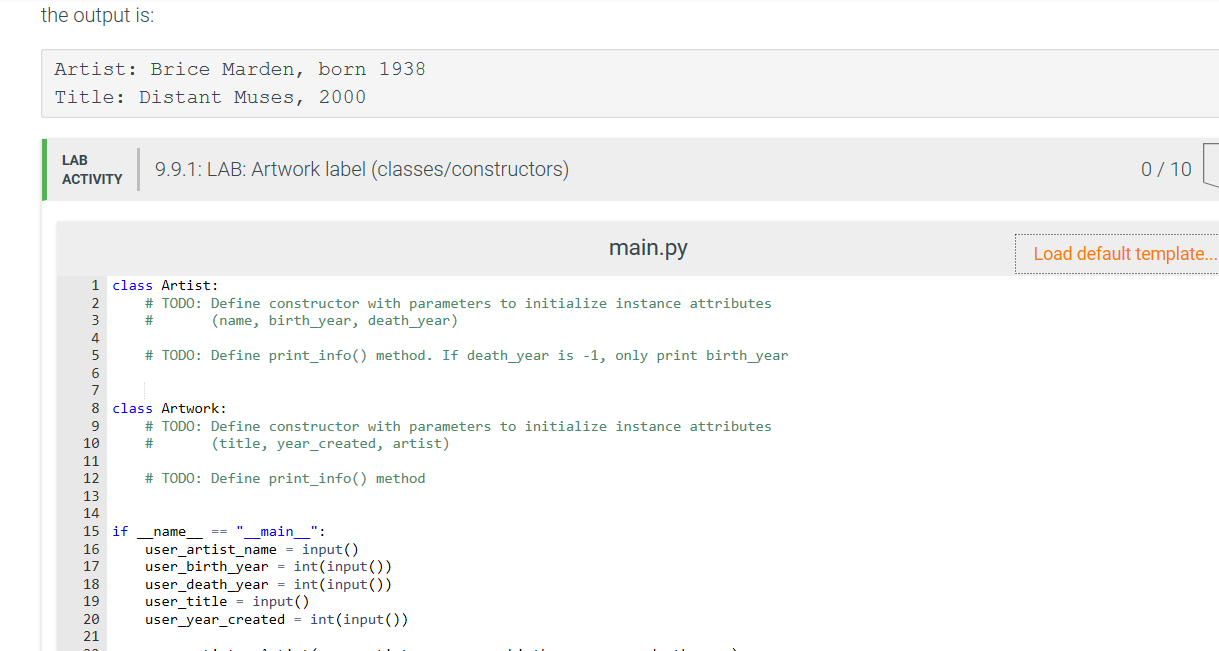
Solved Please Help Have No Idea Whatto Do In Python Pl

Dart Class Constructor Default Value Code Example

Constructor In Python Python Guides
How To Write Both A Parameterized And Default Constructor In A Single Python Class Quora

Python Constructors Tutorialbrain
Python Tutorials Constructor Class And Object Init

Understanding Java Constructor With No Parameter But With Class Variables Stack Overflow

Python Class Init Method Tutorial Wisetut

Constructor In Python Python Guides

Constructor In Python Python Guides

Constructors In Python For Data Science Pst Analytics

How Default Base Class Constructors Are Used With Inheritance Webucator
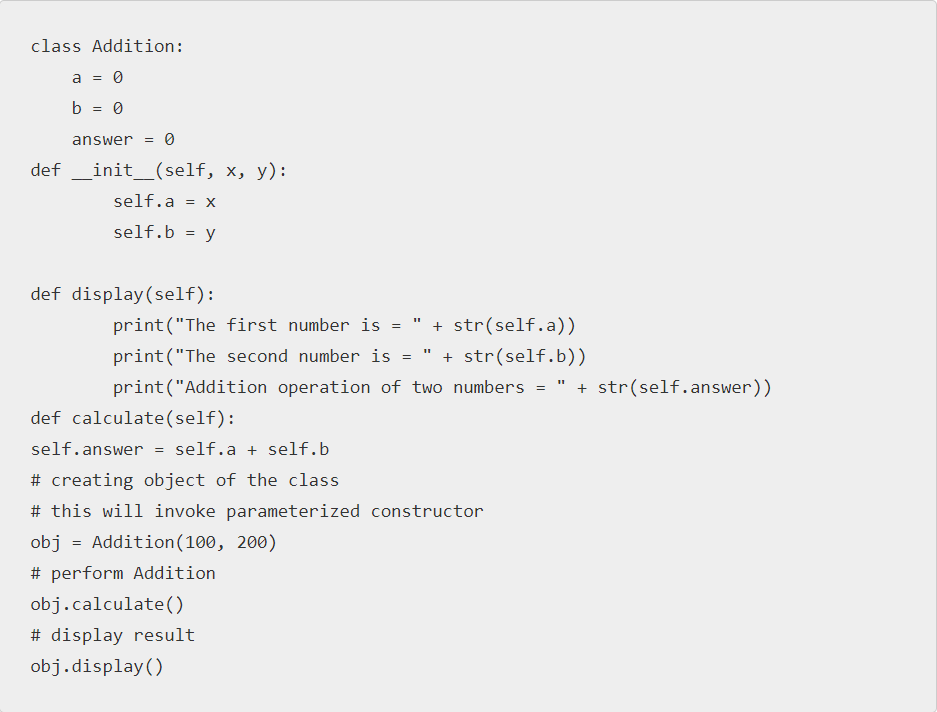
Python Class Constructor Default Parameterized Developer Helps
